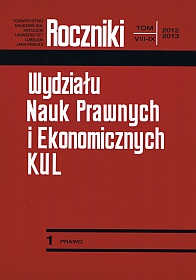Rituals of Border Crossing. Ethnological Reflection on Crossing the Borders
Abstract
A border protects what is inside – orbis interior but simultaneously it lets to adjoin what is outside – orbis exterior. A border does not belong to anybody, it is the area “between”, so on one side it prompts to stop and on the other side it prompts to communication and connectivity. Borders were and are being crossed. Crossing them is connected with the change of the area but also with the experience of difference, alterity, outrangeness. To reduce the fear and anxiety about “the world abroad” and the demilitarised zone itself, there were always the rituals of border crossing. This article presents formal necessities connected with border crossing and it shows magical-religious ways of protection against the dangers lurking in the zone area. in a nowadays globalised world where the borders are wearing away and the countries welcome the comers, the rituals of crossing wither. But there are still places where you can experience these rituals. At the airports and exterior frontiers of the European Union the activities were multiplied to make travellers aware of the meaning of the border crossing. the description of the Polish-Ukrainian border controlling lets us educe the ritual of it and to capture – maybe at the last gasp – the activities performed in the demiliterised zone area.
If the borders still exist, people will need the rituals of crossing them because these rituals give the feeling of safety. They are somehow connected with a kind of necessity but they also reduce the feeling of lost and fear.
References
Burszta J., Wieś małopolska. Studium struktury i organizacji społeczno-przestrzennej wsi Grodzisko w powiecie łańcuckim, Stowarzyszenie Ziemia Grodziska, Poznań 1997.
Bystroń J.S., Tematy, które mi odradzano. Pisma etnograficzne rozproszone, PIW, Warszawa 1980.
Kapuściński R., Imperium, Wydawnictwo Czytelnik, Warszawa 1993.
Kowalski P., Kultura magiczna. Omen, przesąd, znaczenie, Wydawnictwo Naukowe PWN, Warszawa 2007.
Maisonneuve J., Rytuały dawne i współczesne, Gdańskie Wydawnictwo Psychologiczne, Gdańsk 1995.
Maksimczuk A., Sidorowicz L., Ochrona granic i obsługa ruchu granicznego, Wydawnictwo Prawnicze LexisNexis, Warszawa 2007.
Mamzer H., Przekraczanie granic jako przywilej, w: Z. Drozdowicz (red.), Europa w nowych granicach czy Europa bez granic, Wydawnictwo Fundacji Humaniora, Poznań 2004.
Niczyporuk D., Czas i przestrzeń w światopoglądzie mieszkańców wsi, Wydawnictwo UMCS, Lublin 2002.
Stomma L., Antropologia kultury wsi polskiej XIX wieku, Wydawnictwo Piotr Dopierała, Łódź 2002.
Urgacz B., Osobowa koncepcja kultury wsi (analiza strukturalno-funkcjonalna), PAN Instytut Rozwoju Wsi i Rolnictwa, Warszawa 1991.
Van Gennep A., Obrzędy przejścia, PIW, Warszawa 2006.
Zadrożyńska A., Homo faber i homo ludens. Etnologiczny szkic o pracy w kulturach tradycyjnej i współczesnej, Wydawnictwo Naukowe PWN, Warszawa 1983.
Znaniecki F., Socjologiczne podstawy ekologii ludzkiej, „Ruch Prawniczy, Ekonomiczny, Socjologiczny” 1 (1938).
Copyright (c) 2013 Roczniki Wydziału Nauk Prawnych i Ekonomicznych KUL

This work is licensed under a Creative Commons Attribution-NonCommercial-NoDerivatives 4.0 International License.

